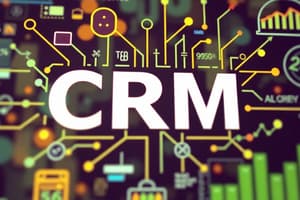Podcast
Questions and Answers
What does NCRMD stand for?
What does NCRMD stand for?
NCRMD is also known as insanity or mental illness
NCRMD is also known as insanity or mental illness
False (B)
What else is NCRMD known as ?
What else is NCRMD known as ?
Is NCRMD a defence?
Is NCRMD a defence?
Who raises the defense of NCRMD?
Who raises the defense of NCRMD?
What happens to an accused once the NCRMD verdict is passed in the trial?
What happens to an accused once the NCRMD verdict is passed in the trial?
what are two types of self defense?
what are two types of self defense?
What are two types of partial defense?
What are two types of partial defense?
Explain the Luca Magnotta case (envelope dude)
Explain the Luca Magnotta case (envelope dude)
Explain the case of Li (Will Baker, cannibalism, beheaded victim)
Explain the case of Li (Will Baker, cannibalism, beheaded victim)
Defendant must first establish that, at the time of the alleged offense, s/he was experiencing a “mental disorder” (just because you have been diagnosed w/a mental disorder does not automatically prove this)
Defendant must first establish that, at the time of the alleged offense, s/he was experiencing a “mental disorder” (just because you have been diagnosed w/a mental disorder does not automatically prove this)
If the disease is not “of such intensity as to render the accused incapable of appreciating the nature and quality of the violent act or of knowing that it is wrong”
If the disease is not “of such intensity as to render the accused incapable of appreciating the nature and quality of the violent act or of knowing that it is wrong”
Question of law is...
Question of law is...
Question of fact is...
Question of fact is...
Explain the Barnier case (demanded to talk to the prime minister)
Explain the Barnier case (demanded to talk to the prime minister)
The meaning of appreciate ...
The meaning of appreciate ...
The meaning of "wrong"...
The meaning of "wrong"...
Explain the R v. Schoenborn (2010) case (thought wife cheated on him)
Explain the R v. Schoenborn (2010) case (thought wife cheated on him)
what is Automatism ? pick the most correct answer
what is Automatism ? pick the most correct answer
5 Categories of Automation
5 Categories of Automation
explain the Parks (1992) case (in laws house, charged with murder)
explain the Parks (1992) case (in laws house, charged with murder)
explain the case of King (1962) (dentist)
explain the case of King (1962) (dentist)
explain the Daviault (1994) case (paralyzed friend, drinking)
explain the Daviault (1994) case (paralyzed friend, drinking)
explain the case of Chaulk (2007) (Landmark) (caffeine pill)
explain the case of Chaulk (2007) (Landmark) (caffeine pill)
explain the Luedecke (2008) case (sexomnia, stranger)
explain the Luedecke (2008) case (sexomnia, stranger)
explain the Stone (1999) case (unhappily married, hunting, wife belittled him a lot)
explain the Stone (1999) case (unhappily married, hunting, wife belittled him a lot)
Flashcards are hidden until you start studying




